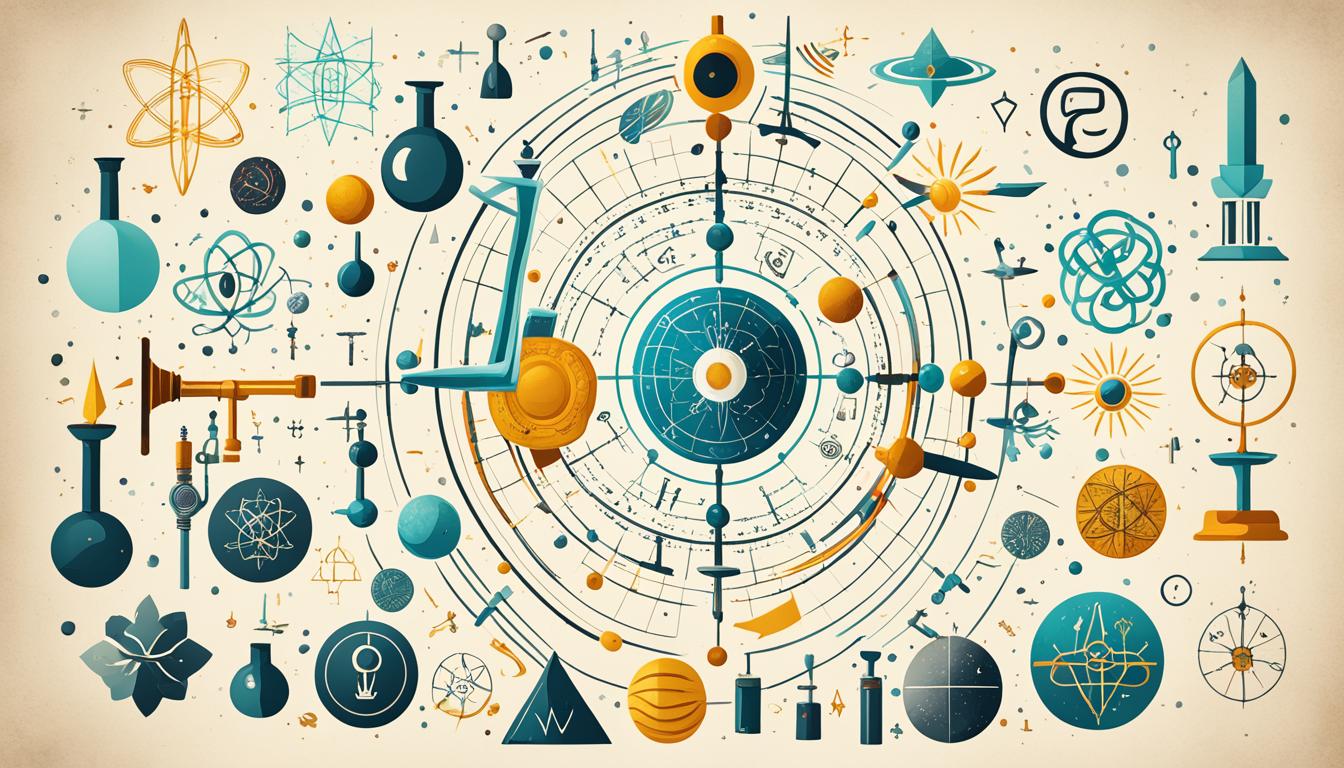The connection between spirituality and science has been a topic of discussion for centuries. Both fields are concerned with understanding the fundamental nature of the universe and our place within it. While science approaches this question through empirical observation and experimentation, spirituality takes a more introspective and subjective approach.
The exploration of the nature of reality is a primary intersection point between spirituality and science. Spiritual practices such as meditation can lead to profound insights into the nature of consciousness and the universe. Scientific disciplines like quantum physics and cosmology challenge our understanding of reality, revealing a more interconnected and mysterious universe. Empirical evidence is also an important aspect shared by both spirituality and science. Both fields value personal experience and the direct apprehension of truth, whether through spiritual practices or rigorous experimentation.
Ultimately, spirituality and science have a vital role to play in our ongoing exploration of the universe and our place within it.
Key Takeaways
- Spirituality and science share a common goal of understanding the nature of reality.
- Spirituality takes a subjective and introspective approach, while science relies on empirical observation and experimentation.
- Both spirituality and science value personal experience and the direct apprehension of truth.
- Scientific disciplines like quantum physics and cosmology challenge our understanding of reality and reveal a more interconnected universe.
- Integrating spirituality and science can lead to a more comprehensive understanding of ourselves and the world.
The Intersection of Spirituality and Science
Spirituality and science intersect in their shared goal of understanding the nature of reality. While spirituality takes a more subjective and introspective approach, science relies on empirical observation and experimentation.
Many spiritual traditions emphasize the importance of meditation and contemplation to gain insight and interconnectedness with the world. Through these practices, individuals can delve deeper into their inner selves, exploring the realms of consciousness and spirituality.
On the other hand, scientific disciplines such as quantum physics and cosmology challenge our understanding of reality and reveal a more interconnected and mysterious universe. Quantum physics, for example, explores the fundamental building blocks of matter and energy, revealing bizarre phenomena such as entanglement and superposition that defy our classical intuitions.
“The most beautiful experience we can have is the mysterious. It is the fundamental emotion that stands at the cradle of true art and true science.” – Albert Einstein
Both spirituality and science offer valuable perspectives and insights into the nature of the universe and our place within it. While spirituality provides a path to connect with our inner selves and the world around us, science unravels the mysteries of the physical world, expanding our knowledge and understanding. By integrating these two realms, we can embark on a journey of self-discovery and intellectual growth.
As we explore the intersection of spirituality and science, we discover the beauty and complexity of existence. Each discipline has its unique contribution, but together they offer a more holistic framework for understanding the universe and our place in it.
The Complementary Nature of Science and Spirituality
Science and spirituality are often seen as conflicting realms, but in reality, they are complementary. Both disciplines seek to understand different aspects of reality, offering unique insights and perspectives. While science focuses on exploring the physical world and uncovering its laws, spirituality delves into the non-physical realm, exploring meaning and purpose in life. By integrating scientific and spiritual perspectives, we can gain a more comprehensive understanding of ourselves and the world around us.
Science and spirituality share common values and goals. Both are driven by curiosity, a desire to explore the unknown, and a quest for truth. Science seeks to answer fundamental questions about the nature of the universe through rigorous observation, experimentation, and logical reasoning. Spirituality, on the other hand, seeks to understand the deeper meaning and purpose of life through introspection, contemplation, and personal experiences. Both disciplines value open-mindedness, wonder, and the pursuit of knowledge.
When we embrace both science and spirituality, we can benefit from the complementary nature of these two approaches. Science provides us with a wealth of knowledge about the physical world, helping us unravel the mysteries of the universe and improve our lives through technological advancements and medical breakthroughs. Spiritual practices, such as meditation and mindfulness, provide us with tools to cultivate self-awareness, inner peace, and a sense of interconnectedness with all beings.
Let’s take a closer look at the complementary aspects of science and spirituality:
The Benefits of Science
Science has greatly shaped our modern world, offering tangible benefits and advancements in various fields. Here are some key benefits:
- Technological Advancements: Science has led to the development of innovative technologies that have revolutionized communication, transportation, medicine, and more.
- Medical Breakthroughs: Scientific research has paved the way for life-saving treatments, vaccines, and improved healthcare practices.
- Environmental Understanding: Science helps us understand the impact of human activities on the environment, leading to efforts for conservation and sustainable practices.
The Insights of Spirituality
Spirituality offers a different perspective, focusing on the exploration of inner experiences, consciousness, and the non-physical aspects of existence. Here are some insights derived from spirituality:
- Meaning and Purpose: Spiritual practices provide individuals with a sense of purpose, helping them discover their values and guiding principles in life.
- Connection and Interconnectedness: Spirituality emphasizes the interconnectedness of all beings, fostering empathy, compassion, and a sense of unity beyond material boundaries.
- Personal Growth and Well-being: Spiritual practices, such as meditation and mindfulness, can promote mental and emotional well-being, reducing stress and enhancing self-awareness.
“The most beautiful and profound emotion we can experience is the sensation of the mystical. It is the sower of all true science.” – Albert Einstein
Albert Einstein himself recognized the connection between science and spirituality, acknowledging that the mystical experience is at the core of true science. Both science and spirituality offer valuable insights into the nature of reality, and their integration allows us to approach life’s questions from multiple perspectives.
| Science | Spirituality |
|---|---|
| Focuses on the physical world and its laws | Explores the non-physical world and its meaning |
| Seeks to explain phenomena through empirical evidence and experimentation | Seeks to find meaning and purpose through introspection and personal experiences |
| Provides technological advancements and medical breakthroughs | Fosters personal growth, well-being, and a sense of interconnectedness |
By embracing the complementary nature of science and spirituality, we can foster a more holistic understanding of ourselves and the world. We can appreciate the wonders of scientific discoveries while also exploring the depths of our inner being. The integration of science and spirituality allows us to lead more meaningful and fulfilling lives, where knowledge and wisdom coexist.
Integrating Science and Spirituality in Your Daily Life
Integrating science and spirituality into our daily lives can have a profound impact on our overall well-being and happiness. By embracing the principles of both disciplines, we can develop a more comprehensive understanding of ourselves and the world around us. Here are some practical ways to integrate science and spirituality into your daily life:
Cultivate Curiosity and Openness
Embracing curiosity and openness allows us to continuously learn and explore new perspectives. Take the time to ask questions, seek knowledge, and expand your understanding of the world. Engage in activities that challenge your beliefs and encourage personal growth. By integrating science and spirituality, we can foster a sense of wonder and intellectual curiosity that enriches our daily experiences.
Develop Critical Thinking Skills
Developing critical thinking skills is essential to navigate the complexities of the modern world. Evaluate the information you encounter by analyzing the evidence, questioning assumptions, and considering multiple perspectives. By incorporating scientific principles into your decision-making process, you can make informed choices based on reason and evidence.
Embrace Humility and Respect
Embracing humility and respect is crucial in fostering harmonious connections with others and the world at large. Recognize that no single belief system or perspective holds all the answers. Cultivate empathy and understanding for different viewpoints, fostering an inclusive mindset. By integrating science and spirituality, we can acknowledge the vastness of knowledge yet to be discovered and approach others with kindness and compassion.
Enhance Creativity and Innovation
Enhancing our creativity and embracing innovative thinking allows us to integrate different ideas and approaches. Both science and spirituality inspire us to think outside the box and explore new possibilities. Embrace unconventional ideas, experiment with new experiences, and allow yourself to tap into your creative potential. By merging science and spirituality, we can unlock breakthroughs and bring forth new solutions to complex challenges.
Practice Compassion and Empathy
Practicing compassion and empathy helps us cultivate deeper connections with others and understand their experiences. Incorporate acts of kindness and understanding into your daily interactions, seeking to create positive change in the lives of those around you. By integrating science and spirituality, we can foster a sense of interconnectedness and promote a more harmonious and compassionate world.
Incorporating these principles into our daily routine allows us to live a more balanced and fulfilling life. Embracing both the analytical nature of science and the introspective aspects of spirituality offers a holistic approach to understanding ourselves and the world. By integrating science and spirituality, we can foster personal growth, build meaningful connections, and contribute to a more harmonious society.
| Benefits of Integrating Science and Spirituality in Daily Life |
|---|
| Enhanced well-being and happiness |
| Improved critical thinking skills |
| Deeper connections with others |
| Expanded creativity and innovation |
| Greater sense of purpose and meaning |

The Benefits of Balancing Science and Intuition
When it comes to understanding the world and ourselves, finding the right balance between science and intuition can yield numerous benefits. By recognizing and embracing both the wonders of science and the power of intuition, we can gain a more holistic and comprehensive perspective on life.
Science, with its rigorous methods and empirical observations, provides us with profound insights into the beauty and intricacy of the natural world. It allows us to explore the mysteries of the universe and discover the underlying laws that govern its functioning. Science fosters curiosity and encourages us to question and explore, leading to continuous personal and intellectual growth.
“The most beautiful thing we can experience is the mysterious. It is the source of all true art and science.” – Albert Einstein
Moreover, science can serve as a spiritual pathway, evoking a sense of awe and humility as we contemplate the vastness and complexity of the universe. From understanding the workings of the human body to unraveling the secrets of distant galaxies, science invites us to marvel at the wonders of creation.

However, science alone cannot provide all the answers. Intuition, our inner wisdom, plays a crucial role in connecting us with deeper truths and guiding us through life’s uncertainties. Intuition allows us to tap into our innate knowledge, often beyond the reach of logical reasoning. It enables us to make intuitive leaps, find creative solutions, and gain insights that go beyond what science can measure and explain.
By combining science and intuition, we create a powerful synergy that enriches our understanding of ourselves and the world. Science provides a solid foundation of knowledge and evidence, while intuition allows us to navigate the vast sea of possibilities and make choices that align with our authentic selves.
Finding Balance: Incorporating Science and Intuition
Here are some practical ways to integrate science and intuition into your life:
- Engage in scientific exploration: Stay curious and continuously seek out new knowledge. Embrace scientific principles and critical thinking to evaluate information objectively.
- Cultivate mindfulness and meditation: Dedicate time for introspection and quiet contemplation. Develop a deeper connection with your intuition and inner wisdom through mindfulness practices.
- Embrace creativity: Allow your intuition to guide your creative endeavors. Embrace the joy of exploring new ideas and expressing yourself through art, music, writing, or any other form of creative expression.
- Trust your gut: Listen to your intuition when making decisions. Pay attention to the subtle cues and feelings that arise within you, and consider them alongside logical reasoning.
- Seek a holistic perspective: Combine scientific knowledge with intuitive insights to gain a more comprehensive understanding of complex topics. Embrace the interconnectedness of all things.
By balancing science and intuition, we can lead more meaningful and fulfilling lives. We become open to the wonders of the natural world while staying connected to our inner selves. This harmony allows us to make informed decisions, explore our passions, and forge deeper connections with others.
| Benefits | Balancing Science and Intuition |
|---|---|
| Expands our knowledge and understanding of the world | Science provides a foundation of facts and evidence, while intuition allows us to explore beyond the boundaries of what is known. |
| Enhances creativity and problem-solving abilities | Combining scientific knowledge and intuitive insights unlocks our creative potential and enables us to find innovative solutions. |
| Fosters personal growth and self-awareness | Intuition guides us on a journey of self-discovery, enabling us to develop a deeper understanding of ourselves and our place in the world. |
| Promotes a sense of wonder and awe | The marvels of science inspire us to appreciate the beauty and complexity of the natural world, fueling a sense of awe and wonder. |
| Encourages holistic decision-making | Considering both scientific evidence and intuitive insights allows us to make well-rounded decisions that align with our values and aspirations. |
Conclusion
The connection between science and spirituality is a complex and multifaceted one. While the two fields may approach the understanding of reality from different angles, they share a fundamental commitment to unraveling the mysteries of the universe. By recognizing the complementary nature of science and spirituality, we can integrate both into our daily lives for a more balanced and fulfilling existence.
Integrating science and spirituality allows us to cultivate curiosity, critical thinking, and humility. It encourages us to explore the wonders of the physical world through scientific inquiry, while also tapping into our intuition and connecting with our inner wisdom. This balance of science and spirituality enables us to gain a more comprehensive understanding of ourselves and the world around us.
By embracing both science and spirituality, we can foster personal growth and improve our overall well-being. This integration invites creativity, compassion, and empathy into our lives, inspiring us to think innovatively and care deeply for others. This holistic approach to life leads to a more meaningful and fulfilling existence, where we continually strive to find harmony between the empirical and the spiritual.
FAQ
What is the connection between spirituality and science?
The connection between spirituality and science lies in their shared goal of understanding the nature of reality. While science takes an empirical and experimental approach, spirituality explores reality through introspection and subjectivity.
How do spirituality and science intersect?
Spirituality and science intersect in their exploration of the nature of reality. Spiritual practices such as meditation provide profound insights into consciousness, while scientific disciplines like quantum physics challenge our understanding of the universe.
Are spirituality and science compatible?
Yes, spirituality and science are complementary rather than incompatible. They both seek to understand different aspects of reality and share common goals and values. Integrating both can lead to a more comprehensive understanding of ourselves and the world.
How can integrating science and spirituality enhance our lives?
Integrating science and spirituality can enhance our well-being and happiness by cultivating curiosity, critical thinking, humility, creativity, compassion, and empathy. This balance fosters personal growth and a more meaningful and fulfilling life.
What are the benefits of balancing science and intuition?
Balancing science and intuition allows us to appreciate the beauty and intricacy of the world while tapping into our deeper sense of knowing. By combining both, we gain a more holistic and comprehensive understanding of ourselves and the world.
Can science and spirituality coexist?
Yes, science and spirituality can coexist and enrich our lives. Recognizing their complementary nature and integrating both into our daily lives allows us to gain a more comprehensive understanding of ourselves and the world.
